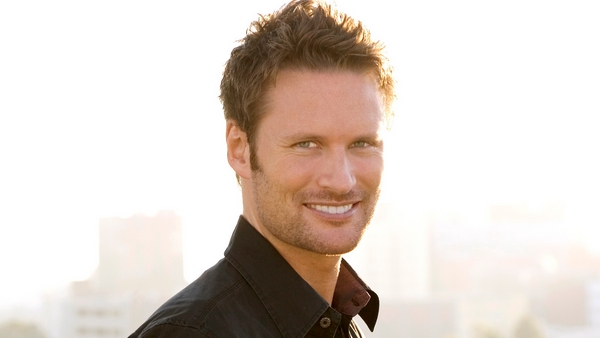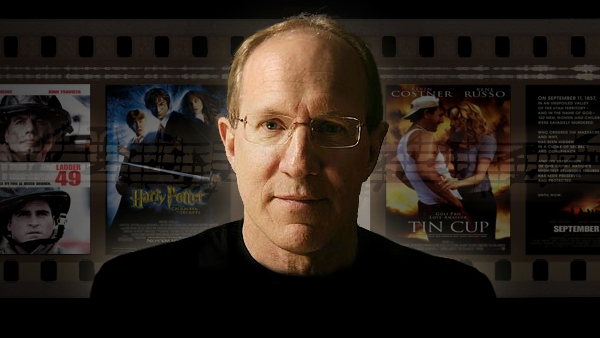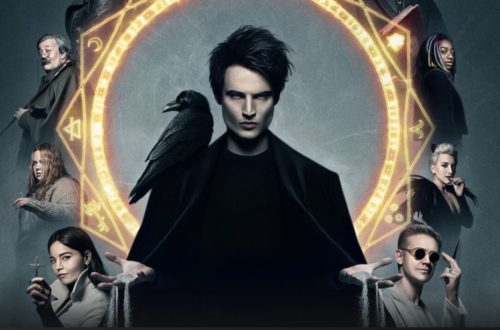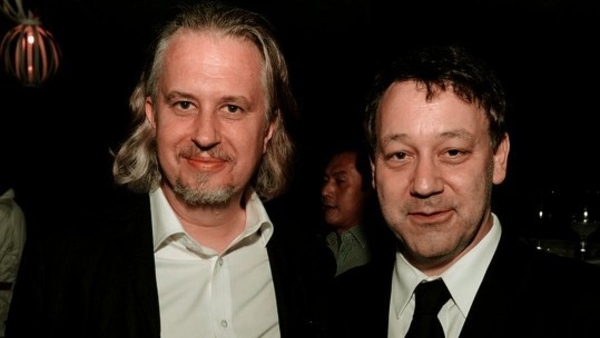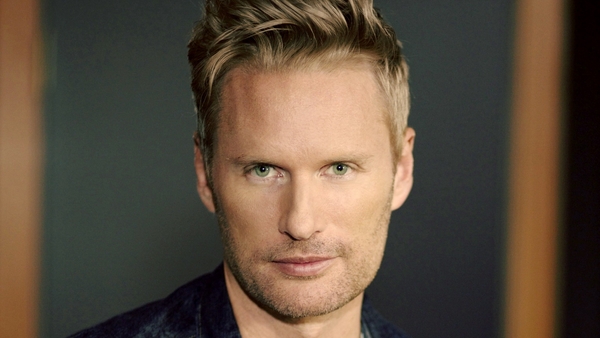 Brian Tyler is a film and TV composer/conductor with over 60 films to his credit. Tyler began scoring features shortly after he received his master’s degree from Harvard University, as well as a bachelor’s degree from UCLA. He is a multi-instrumentalist and plays piano, guitar, drums, bass, cello, world percussion, synth programming, guitarviol, charango, and bouzouki, amongst others.
Brian Tyler is a film and TV composer/conductor with over 60 films to his credit. Tyler began scoring features shortly after he received his master’s degree from Harvard University, as well as a bachelor’s degree from UCLA. He is a multi-instrumentalist and plays piano, guitar, drums, bass, cello, world percussion, synth programming, guitarviol, charango, and bouzouki, amongst others.
Tyler is currently scoring Avengers: Age of Ultron which follows on the heels of his other scores for previous the Marvel films Iron Man 3 and Thor: The Dark World. He also composed the Marvel fanfare (which plays before all Marvel features) and prior to that he composed, arranged and conducted the new film logo music for Universal Pictures – the theme for the 100 year anniversary of the studio.
In the middle of his continually overlapping schedules, that finds scores for three films he’s worked on being released in August alone, Brian was able to talk to us about his process, his high-energy approach and how he just loves to keep busy. Enjoy our time with composer Brian Tyler.
GST: Hi Brian, glad to be sitting with you again. You’ve been very busy since the last time we talked. So, how’ve you been keeping up?
BT: It’s tricky *laughs* but I love what I do. I work a lot and I love getting my music out there so people can hear it. It was always the drive when I was growing up and started writing music. The one frustration I always had was that I never felt ok writing music that only I would hear. I wanted to have people hear it and, whether they like it, hate it, or something in between, I was driven to keep putting my stuff out there and so doing that keeps me busy.
GST: I’ve been following your work for years and you do so many things yourself, but I imagine, these days, you have to have a great support staff. You can’t do it all so what kind of help do you get on a day to day basis?
BT: You have to have good assistants – engineers and technical people who keep Pro Tools running, piano tuners, people like that from top to bottom. I used to do everything myself and couldn’t let go of any of it. I still probably do too much, *laughs*I still mix my own stuff and program my own synths and I do all the drumming, the piano parts, all the guitars and there’s a lot of things that I probably should let go of but I can’t. I still conduct all my own scores and it’s just because I want to keep as much of a personal connection to it as possible but certainly, in terms of the music itself, I feel I need to be the one doing it all so it can remain my own voice, you know?
GST: Well sure. Like all great artists you have to be a little bit of a control freak so that makes sense.
BT: In fact I remember at one time I had to be convinced to stop being my own music editor. On all of my old films I was always edited the music which makes no sense whatsoever but I think, over the years, I’ve managed to let a few things go.
GST: Aside from maybe Alexandre Desplat you’re probably the busiest guy in the music business. You’ve got scores for three movies coming out this month alone.
BT: Yeah, it is crazy. Three movies, then I’ve got my album project Madsonik, TV shows Hawaii
Five-O and Sleepy Hollow and the new one Scorpion. Then there’s a little film called Avengers: Age of Ultron *laughs* so it’s nuts but it keeps me going.*laughs* Plus for me it’s all about changing it up and I go from writing one style to something else which keeps it interesting because one project starts to fuel the other.
GST: Speaking of Sleepy Hollow, congrats on your Emmy nomination. But you also cleaned up at the BMI awards, received five ASCAP Music Awards, were named Film Composer of the Year at the 2014 Cue Awards, got a BAFTA nomination for best video game soundtrack and, well, what haven’t you won? Maybe we start with that and work backwards. *laughs*
BT: *laughs* The Oscar! That’s the one! We’ll see how that goes. *laughs*
GST: *laughs* Well there’s that old joke that once you win one, you’ll never work again.
BT: Yeah exactly right.*laughs* The Curse of the Oscar! But I’m just enjoying the ride so I’m in no rush!
GST: As I said before, I’m a fan, so I’m amazed to see how much has progressed in so little time. I still remember watching the special feature on the Bubba Ho-Tep DVD where you talked about your music, then seeing you go to do great work on The Killing Room, knocking it out of the park with scores to Iron Man 3 and Now You See Me and then writing not one but two fanfares. That’s huge. Studios are putting a lot of faith in you so what kind of responsibilities and pressures are you facing at this point in your career?
BT: It is kind of wild because, in a sense, I come from making small and independent films. That’s why I used to play all the instruments and everything – because we couldn’t afford an orchestra. On Bubba Ho-Tep I’d sing all the choir parts,
one by one, one voice at a time and I think maybe that kind of passion was seen as a focused and never-say-die attitude which gets noticed whether you know it or not. Then, other times, people you work with will move on and call you up one day. Jonathan Liebesman for instance, well, we did The Killing Room like you mentioned. It was a small film that was really claustrophobic and I played a lot of cello on that and we kind of made this propaganda, Soviet-styled score and now here we are with Teenage Mutant Ninja Turtles and he was the one who took me along for the ride. So I feel really lucky in that way.
GST: Speaking of Jonathan Liebesman, last time we spoke you were about to start work on Ninja Turtles. You were excited because it’s something we both grew up with. So what’s better, working with good friends or on a nostalgia project?
BT: With so many of the projects I’m working on I did grow up with TMNT, Avengers, Iron Man, etc. and for me it’s really cool to be part of something being a fan whether it’s from your childhood or not. But being excited about it, whatever it is, it key. Whether it’s The Expendables or Thor: The Dark World, I, as a fan, want to be the first person to see the movie. So as I’m scoring it, I’m able to do that which is awesome. *laughs*
GST: Considering all the work you’ve done for Marvel it seems like they’re gearing you up to be their in-house guy. Are you overseeing all Marvel features, like a modern day John Barry? *laughs*
BT: Ohh, well I do love John Barry! *laughs* I’ll say that up front because one day
me, Shane Black and Kevin Feige ware all sitting around and playing “name that theme” and I thought I’d stump them by playing the overture from The Black Hole by John Barry, but they totally nailed it *laughs* so I guess it all ties in. They’re all huge film score fans, those two. But I think with Marvel that it’s about seeing eye to eye about film and music. I definitely have a penchant for writing throwback scores that have big brass themes with strings and choir and things that are melodic as opposed to being necessarily chordal.
GST: Well what I meant by that was how Barry kept up an overarching theme and mood for the Bond series. So I wondered if you and Kevin Feige had discussed something that was more Avengers-centric from here on in even if you had to cast aside the great themes you and other composers had developed for the individual characters prior to this point.
BT: Since there are so many characters in the Avengers who connect to their own series we want to keep building off what Alan Silvestri had started. You want a common through line and continuity, sure, but now that we’ve reset the themes for Thor and Iron Man in the last two films you still want to bring those themes along with the work done by other composers to a center and then go from there.
GST: Based on how busy you are you’re probably turning down work and getting your pick of real high profile projects. But these days have you ever walked into a project to find the director temped the movie with your music or had them say “I like this, do that again.”?
BT: *laughs* That happens all the time! But I have a terrible habit of ignoring temps. It’s probably at my own peril, but I try not to be influenced by them or listen to them all that much. You can recognize your own music and hear what the director or producers want from it, or another artists’ work. Now stylistically it may work but you always want to bring something new to the table and it’s my job to do what’s best for the film, not copy myself or my themes.
GST: As far as a strong theme, the Ninja Turtles score is amazing because it’s driven and powered by a bombastic trio of drums, horns and choir. It also has an emotional heart that exists between those drum beats. But score aside, these aren’t quite the Turtles we grew up with, so what did you like about this reinvention?
BT: I think this has a really good origin story and there’s not one true Turtles story unless you go back to the original black and white comic. By the time it hit a series and the movies and the secondary comic series and other shows you have a lot of different story lines going on. But this one connects April O’Neil with her father and the mutagen and the Turtles and I think that was a really nice way to do that. As a Turtles fan I’m really happy.
GST: Jumping gears a bit, Into the Storm is an emotional disaster film, one you said “emphasizes human emotion including loneliness”. It’s interesting because there’s no good guy or bad guy. The only thing that will save these people is time, when the storm subsides. There’s no superheros or regular heroes, it’s just people. How does this compare to something like Fast Five or other high intensity films?
BT: You’re exactly right. In a way it makes it scarier because there is no particular bad guy you can point at. But
certainly the fact that the villain is nature is something to be respected in addition to being feared. It humanizes the story which is like if you were out in the Savannah and being stalked by a lion. The lion isn’t evil, it’s hungry and to him, you’re lunch. Same thing with the storm. You’re just getting caught in it, not attacked by it. So that made me try to give a personality to the storm which is why I have these distant flutes, etc. We have these long quiet static moments of sustains before the storm kicks in. The other thing here, the main struggle, is the line between life and death, the humanity that comes out of that which is why the score is quite melancholy and more emotional and sad than most people realize.
GST: There’s one kind of flute I can’t place, it’s the kind of native woodwind that James Horner uses a lot in his scores. What is that?
BT: It’s basically a bamboo flute. Most Eastern and African cultures have a version of this instrument – sometimes it’s called the bansuri – but you’re just blowing air across a hollowed out stick and it has this eerie quality when you record it really far away, and put reverb on it, etc. I felt it captured the sound of the nascent storm before it really kicked up. After that, the strings pick up and the flute kind of floats in the middle of that when the melody picks up. It’s quite a conceptual score actually.
GST: To many film score fans, composers are rock stars. But you pretty much are a bona fide rock star. You play 40 instruments and you’ve got the look rocking out on guitar, or drums or even conducting. So when you’re working, and say you’ve just come up with the first few hard hitting notes to The Expendables theme, what instrument do you first grab to help you see if it sounds as good as you thought it did in your head?
BT: It depends. I often write on the piano but sometimes I don’t use an instrument and I just write the notes down. But other times it’s great to have something in your hands. I do write on guitar and on cello a lot and sometimes I’ll start with percussion, drums, timpani, so it varies.
GST: Speaking of The Expendables III, you’ve got a physical release of the CD being produced by La-La Land Records. I just spoke with Steve Jablonsky and he says that Paramount is getting away from hard copies which is why Transformers 3 and 4 are only available digitally. Is that the route composers are starting to take, through them or maybe Mondo with their cool vinyl releases, to make sure the music gets in the hands of pure fans?
BT: I find that in order to make sure it gets out there you always want to push for some way to have a hard copy of the music, and you’re right, that’s often the way to do it. I’m glad there are labels that are into that because I love hard copies and I love for people to hear it in the best possible quality. So when I can, that’s what I do.
GST: Well it’s that tangibility.
BT: Totally! I’m a film composer but I am also a film score fan and you can tell when you look around my home. You can see by the binder whether it’s Milan or La-La Land, whatever and it’s important to me so I know how fans are disappointed when something is not released on a CD. But they have to know it has nothing to do with me. I’m on your side guys, but there’s only so much I can do! *laughs*
GST: Ok, well to wrap this up I’ll ask an easy, and maybe unexpected question. Who is your favorite TMNT character? It doesn’t have to be a Turtle but as a follow up, did it your answer change after seeing this movie?
BT: Growing up, I was always fond of Shredder.*laughs* For Halloween I always wanted to be Darth Vader or Shredder or whatever bad guy as long as they looked cool. *laughs* But after this one, I have to say that Michelangelo kind of steals the show! I’ve always had a soft spot for him anyway. I like the way he just can’t help himself around
April and he always seems to be a step behind everyone else. But then I love Raph as well because he’s a tough guy with a soft underbelly and it’s great that we got to see that side of him here. If I had to chose one though, for me it’s Shredder.
GST: Same question for Marvel. Whether or not you’ve scored the films, do you have one favorite?
BT: Ok, this is tough for me because I have such a connection with Iron Man and Thor. It’s a toss up and for me kind of depends on the day…though some days I’d choose both of them. *laughs* I think they’re great characters with underlying humor that makes their badassery even cooler. Clearly Tony Stark is one of the all time great movie characters so I’ll go with Tony.
GST: Since we’re on Avengers, can you give us hints about Age of Ultron? Anything at all? I read that article Variety wrote about you drawing inspiration for the upcoming score from John Williams’ themes for Raider of the Lost Ark and Superman. Anything you want to elaborate on? Can we get an exclusive from you? *laughs*
BT: It’s funny, I saw that too. *laughs* I kind of just said it in passing but it’s true in a sense that what those scores
represent melodically and orchestrationally and how they work with picture is pretty key in that you can cover the range of emotions very well. You can go from super adventurous and triumphant to moments in Raiders that are pretty dark and have a lot of gravitas. So it’s hard to think of higher bars to reach in the world of film music than those scores. But right now it’s just so early in the process. That said, the one thing I can tell you is that it’s gonna be awesome!
GST: Can’t wait for that! Before we finish up, as you’ve done fanfares that lead into a film, I’d like to propose that before a film starts we get to see a Brian Tyler PSA, or a sticker on the album advising film score fans that it’s not a good idea to listen to your music while driving. You can get a speeding ticket! *laughs*
BT: Funny enough, that has happened! *laughs*
GST: Well we can save that story for another time. Thanks again for your time Brian. Talk to you next time you come up for air. *laughs* Sooner rather than later I hope.
BT: You got it, talk to you soon!
Teenage Mutant Ninja Turtles and Into the Storm is in theaters Friday, August 8th. The Expendables 3 opens on August 15 and the original motion picture score, composed by Brian Tyler, is being released by La-La Land Records physically on August 26th. Avengers: Age of Ultron is scheduled for release next Spring on May 1st, 2015. As Brian just said, “it’s gonna be awesome!“
